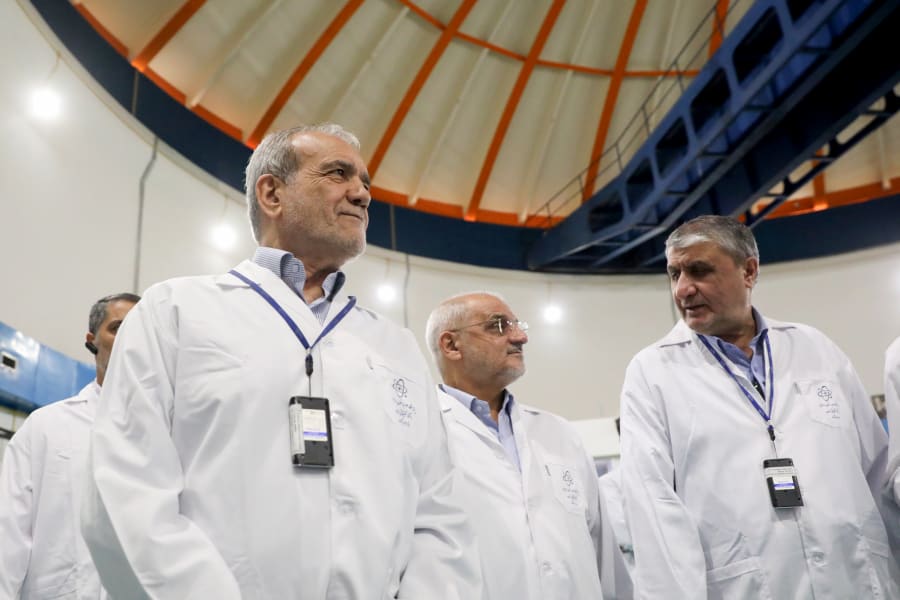Iranian president vows to rebuild nuclear facilities even stronger after US strikes
Former Mossad chief: 'Nuclear sites were obliterated, no enrichment right now'

Iranian President Masoud Pezeshkian vowed that the regime’s nuclear facilities would be rebuilt stronger than before, despite the destruction wrought by joint U.S. and Israeli strikes earlier this year.
During a tour of the country’s Atomic Energy Organization, Pezeshkian said that “the destruction of nuclear facilities will not delay our progress; we will rebuild them stronger.”
“All our nuclear activities are aimed at solving civilian problems and are not for military use. We consider a nuclear bomb forbidden,” he added.
A regime spokeswoman said on Sunday that Iran had received messages calling it to renew negotiations for a nuclear agreement, but noted that “Details about the nature and content of the messages will be provided at the appropriate time.”
This came in response to a report by Iraqi outlet Baghdad Al-Youm, citing diplomatic sources in Tehran saying that Oman transmitted a message expressing Washington’s willingness to resume nuclear negotiations.
The former director of the Israeli Mossad, Yossi Cohen, confirmed in an interview with Fox News that the regime’s facilities suffered critical damage in the American strikes.
“Since June 2025, Iran has been in a different position,” he said, “I can absolutely accept the president’s description that Iran’s nuclear sites were obliterated. I know for sure that Iran doesn’t enrich uranium these days, which is a great achievement. And more than that, Iran knows two things: first, that we can, and we did – with the U.S., in beautiful cooperation and coordination. And second, something even more important – we can come again.”
“We destroyed their air-defense systems, their Revolutionary Guard sites, we chased their filthy terrorists in their own bedrooms and beds inside Tehran and other cities,” said Cohen.
“We destroyed the nuclear facilities that were threatening the State of Israel up to the level of an existential threat – and they know that we’ve done a beautiful job there.”
Most Iranian officials have claimed that the facilities had only suffered minor or easily repairable damage in the U.S. military’s “Operation Midnight Hammer”.
Since then, intelligence information and media reports have suggested that the regime is working to restore the nuclear sites and rebuild its missile capabilities, which were also significantly degraded during the 12-Day War.
Iran’s foreign minister, Abbas Araghchi, affirmed to Al Jazeera on Saturday that the regime would not stop its program to enrich uranium or negotiate over its missile program.
He acknowledged that nuclear sites were damaged in the war but noted their enrichment technology remained intact, with nuclear materials still remaining at the bombed facilities.
CNN reported last week that European intelligence sources state that China increased its shipments of sodium perchlorate, needed for rocket fuel production, to Iran, despite international sanctions.
The report said that, according to estimates, 10 to 12 sea shipments, totaling about 2,000 tons and enough to produce about 500 missiles, have reached Iran.
However, Ynet News’ Ron Ben-Yishai emphasized that Iran still lacks planetary mixers, a crucial component in the ballistic missile fuel production, which Israel destroyed.
Despite its attempts to rebuild, former Mossad chief Yossi Cohen said he believes the days of the Iranian regime are numbered.
“The Iranian people suffer under a cruel regime – anyone who dares to protest is hanged or shot,” said Cohen. “But I believe the time has come, and if the world supports it, it will happen.”

The All Israel News Staff is a team of journalists in Israel.
You might also like to read this:
















